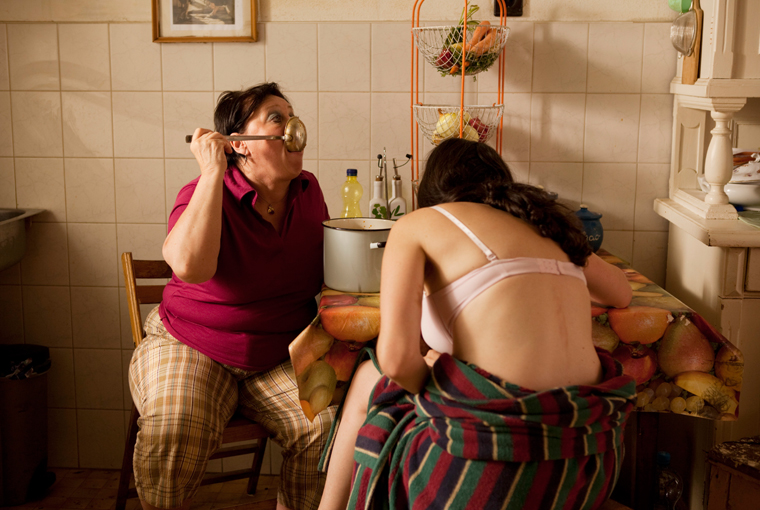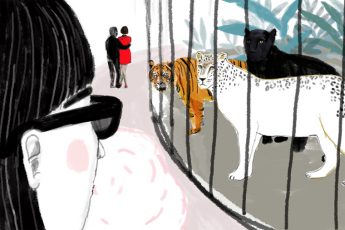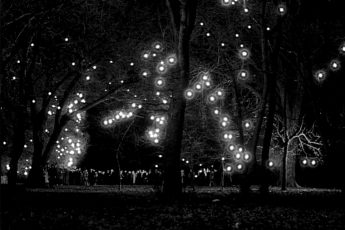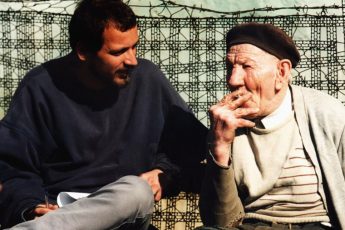Problems
Réka Kincses’s Homeland, Sex and Further Inconveniences (Szülőfold, szex és más kellemetlenségek, 2012)
Vol. 30 (June 2013) by Konstanty Kuzma
Is it wrong that I still desire my wife after 13 years of marriage?” The rhetorical questions asked by Sandor in the curious counseling sessions he attends together with his wife Zsuzsana have, indeed, the same purpose that all rhetorical questions do: making a point. To Sandor, the problem is fairly straightforward: he wants sex, but his wife doesn’t seem to. When he buys her a vibrator, she’s merely entertained by the jerky movements it performs when put on a flat surface. Zsuzsana is facing problems of her own, even if she’s less sure about what they are than Sandor is (yes, in this film, the husband is pragmatic and rational, and the woman is confused and irrational): living in Germany and being away from home (Hungary) appear to play a role. But when the couple’s children leave on a school trip, there are no more excuses not to “spend time” together. Or are there? Conveniently, an old friend calls Zsuzsana to ask if she can visit. A few scenes (and a compensating hand-job) later, they sit together with Zsuzsana’s friend and her boyfriend in the kitchen, and Sandor and Zsuzsana speak Hungarian as if it’s what they always did. Zsuzsana’s guests are in Germany to film Hungarians living abroad. When Zsuzsana and Sandor also find themselves in it, it brings out their differences ever more clearly (like the counseling sessions, Kincses uses the interview as a way to grant the viewers greater access to the characters and their self-perception).
Where Sandor adopts the (supposed) religious orderliness of the Germans carelessly – naturally, one could say-, Zsuzsana hardly shares her husband’s pragmatism. Unsure about whether she is really happy with her life the way it is, she begins challenging its aspects one by one: bored by her husband, she cheats on him; unchallenged by work, she questions it; alienated by Germany, she flees home. Of course, adulthood sets its barriers: fleeing home is not the same at 40 as it is at 14. With a partner, a job, and children (who, somewhat implausibly, do disappear after the school trip), actions usually have greater consequences than poorly-portioned disciplinary measures by your guardians. Nevertheless, Zsuzsanna finally makes the leap, finding herself back in Hungary at her mother’s place. But as Zsuzsi begins settling down, she realizes that here, too, happiness is not so easy to come by. Perhaps, it is not (just) Germany after all? Zsuzsanna and her lover continue their romance in Budapest, but it’s not the fairy-tale like relationship that she may have hoped for. Even when it comes to cheating, so it seems, reality is unmatched by fantasy. Finally, after a childhood spent in Austria and a marriage spent in Germany, home has drifted away…
Not refraining from personal and embarrassing scenes which are alternately further ridiculed by humor, Kincses depicts her protagonists’ emotional roller coaster with bold honesty. That is why the intentionally austere visuals are quickly accepted by the viewer: they fit the documentary intimacy dictated by both the acting and the sluggish, erratic narrative. Although Kincses told us that there wasn’t much space for improvisation on set, many scenes seem as if directly taken out of a couple’s bedroom. It’s a pity, then, that the film misses the opportunity to go one layer further and assess the reality orchestrated so minutely. As suggested by the title, Kincses struggles to settle on a particular theme: Zsuzsana’s search for identity is just as much part of her yearning for independence as it is tied to her neglected national origin and her forgotten childhood. On the one hand, that gives the film a variety of impulses, which, given the complexity of marriage, is laudable; on the other, it diverts the viewer from a truly discernible plot line, leaving him in a situation which, in the long run, is worryingly close to that of Zsuzsana. First angelically innocent, soon disobedient and promiscuous, Zsuzsana’s capricious mind remains ultimately impenetrable (a fact which strengthens the resemblance of Krisztina Kerekes – who has wide, brushy eyebrows – to Frieda Kahlo). In the end, the viewer can only wonder what the point of this story was, a sadly poignant conclusion to an authentic, challenging and entertaining glimpse into a slowly imploding relationship.




Leave a Comment